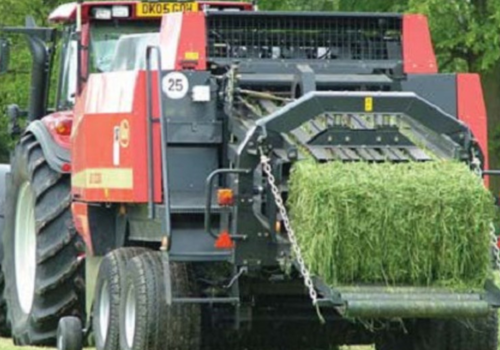What is Silage?
In farming, silage is a type of animal fodder produced by preserving grass or other green crops through fermentation. Silage is more than often grass, but can be other crops including maize or rye. The fermentation process retains a high percentage of the crop’s natural nutrients, providing a valuable source of energy, protein, vitamins and minerals for cattle and sheep throughout winter, when pasture is scarce.
Producing high-quality silage is essential for UK livestock farmers aiming to maintain animal health and optimise milk and meat yields. Selecting the appropriate grass seed mixture is a critical step in achieving this goal.
Key Grass Types for Silage Production
Italian Ryegrass (Lolium multiflorum) - Italian ryegrass is renowned for its rapid establishment and high yields, making it ideal for short-term leys. It offers excellent spring growth and is suitable for multiple cuts per season. However, it lacks the persistence of other ryegrass types, making it less suitable for long-term pastures. The BS Italian Ryegrass Seed Blend - 1-2 yrs Ley Mixture is a versatile short-term species.
Perennial Ryegrass (Lolium perenne) - perennial ryegrass is a staple in UK pastures due to its adaptability and high-quality forage. It provides good yields and is suitable for both grazing and silage. Its persistence makes it ideal for long-term leys. BS Silage & Haylage - 1-2 yrs Ley Mixture contains a high percentage of both perennial ryegrass and Italian ryegrass.
Diploid and Tetraploid Varieties
Understanding the difference between diploid and tetraploid ryegrasses is crucial:
Diploid varieties - these have smaller cells, resulting in denser swards. They are more tolerant to grazing and have better ground cover, reducing weed invasion. Diploids are also better suited to wet conditions.
Tetraploid varieties - these have larger cells, leading to higher water content and palatability. They are more upright, making them easier to cut for silage, and often have higher sugar content, which aids fermentation.
The grass variety you choose, however, doesn’t have to be exclusively one or the other and many farmers use a mixture of both to reap the benefits of each. The BS Cutter - 2-3 yrs Ley Mixture contains both diploid and tetraploid varieties, to give excellent forage quality and good regrowth after cutting.
Recommended Grass Seed Mixtures for Silage
At Boston Seeds, we supply several seed mixtures have been developed to optimise silage production in the UK:
Aber High Sugar Grass (HSG) Mixtures - these mixtures, such as Aber High Sugar Grass - Medium Term Silage (With Red Clover), combine high sugar tetraploid ryegrasses and diploid perennial ryegrasses with red clover to enhance fermentation and protein content. They are designed for multiple cuts per season and are suitable for medium-term leys.
BS Westerwolds Ryegrass Seed - 1-2 yrs Ley Mixture is suitable for silage, hay production, grazing and green manure and can be sown from spring through to autumn.
Browse our Agricultural Grass Seed or request a catalogue to view our entire range.
Additional Considerations when choosing Grass Seed for Silage
• Soil type - select mixtures that match your soil conditions. For example, heavy soil mixtures may include species like Timothy, which perform well in cooler, heavier soils. BS MeadowMax - Old Fashioned, 5+ yrs Ley Mixture is a traditional ley with a 25% Timothy content, which tolerates wet and drought conditions.
• Climate - consider the local climate. In wet areas choose grass varieties like perennial ryegrass, tall fescue that handles wet and dry soils, along with red clover also known for its shade tolerance.
• Management practices - implement proper fertilisation and cutting regimes to maximise yield and quality. Regularly monitor sward health and reseed as necessary to maintain productivity.
Grass Seed for Silage from Boston Seeds
Choosing the right grass seed mixture is vital for efficient silage production in the UK. By considering factors like grass type, ploidy, soil conditions, and management practices, farmers can select mixtures that offer high yields, quality forage, and persistence. At Boston Seeds, our experts can help you to make informed decisions and are available on 01205 280 069. Alternatively, fill out our contact form or send us an email to [email protected]
